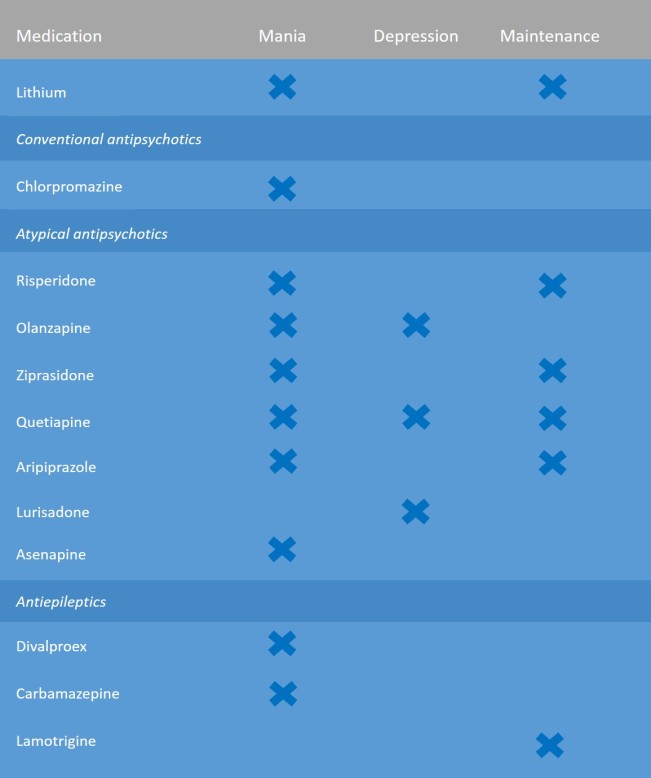
Unlike unipolar depression, bipolar will almost always need to be treated medically as it is a biological imbalance of the brain that needs to be corrected.
There are various different medications that can assist in treating bipolar, as every person is unique, every treatment is thus unique. The three main categories of bipolar medications are; conventional antipsychotics, atypical antipsychotics, antiepileptics. The below table shows what phase of bipolar each of the medications is usually prescribed for;

Although mania is what usually defines bipolar, it is often the depression that will effect individuals the most (like myself – especially as I have depressive bipolar). There have been minimal studies on antidepressants prescribed to bipolar sufferers, the main concern here, is taking an antidepressant can trigger rapid-cycling (when an individual has four or more mania or hypomania episodes in a year). The reason behind this is that an antidepressant is designed to bring you out of depression by giving you a false high (the aim is to feel ‘normal’ not low or high), however as a bipolar sufferer, one already experiences ‘highs’ when an individual has a period of mania, this means that the antidepressant can cause a more frequent cycle of mania or hypomania.
As you will see from the table above, the only medication that is currently used for all 3 phases (mania, depression and maintenance) is Quetiapine. I am lucky that this was what I was prescribed when I was FINALLY diagnosed with bipolar 2 years ago after 16 years of mental illness. In the year before pregnancy whilst taking Quetiapine, my life became more ‘normal’ than I ever thought possible as I had been in and out of the mental health system for 16 years previous to this. Unfortunately during pregnancy I was not so stable, this is not surprising when you think of all of the hormones involved in pregnancy competing with the hormonal imbalance of bipolar. It is important to point out, that this is merely my experience, as mentioned previously, we are all different, therefore, our reactions to different medications could be poles apart. Since the age of 16, I have been on 10 different medications over the years at varying doses, and only recently have I found the right one for me. If a medication is not working for you, do not be afraid to ask your psychiatrist and/or GP for a different one. It is your body and only you know if a medication is working or not.
Lithium is the most commonly prescribed medication for bipolar sufferers, it is best used for mania and bipolar maintenance, however is not as affective in its usage against bipolar depression. As discussed above, Quetiapine is used for all 3 phases of bipolar, therefore it is helpful in the treatment against mania, depression and the maintenance of bipolar overall. Olanzapine is another medication that is useful in the treatment of both mania and depression. The rest of the medications shown in the table above are more often (but not always) used in the treatment of the mania phase of bipolar.
Quetiapine is one of the bipolar medications that is considered ‘OK’ to take when pregnant. My next blog will detail the pros and cons of each of the above mentioned medications in relation to pregnancy and breast feeding.
Helpful links
Royal College of Psychiatrists – Antipsychotics
I’m type two bipolar myself (Major depressive side of the scale). To me, the full blown manic of type one is a danger to your assets and possibly even those around you whereas the depression of type one is a danger to your continued existance, to me that makes type one the worse of the two to have, but that’s just my opinion.
My doctor recently switched me to Seroqual (Quetiapine) and so far it’s doing wonders but I am holding my breath for when it take it’s dive like Lithium did. I hate that the medications give you a couple of months of bliss when you initially start using them and then just out of nowhere the floor drops from under you and the effects mellow out to a point where your doc decides “It’s doing a good job at managing things, I’m not going to mess with things now” instead of trying to help you to get back to that level of normalsy you felt.
I love feeling normal, I don’t want it to change … oh god I don’t want it to change … but it will, eventually and I will be back to square one.